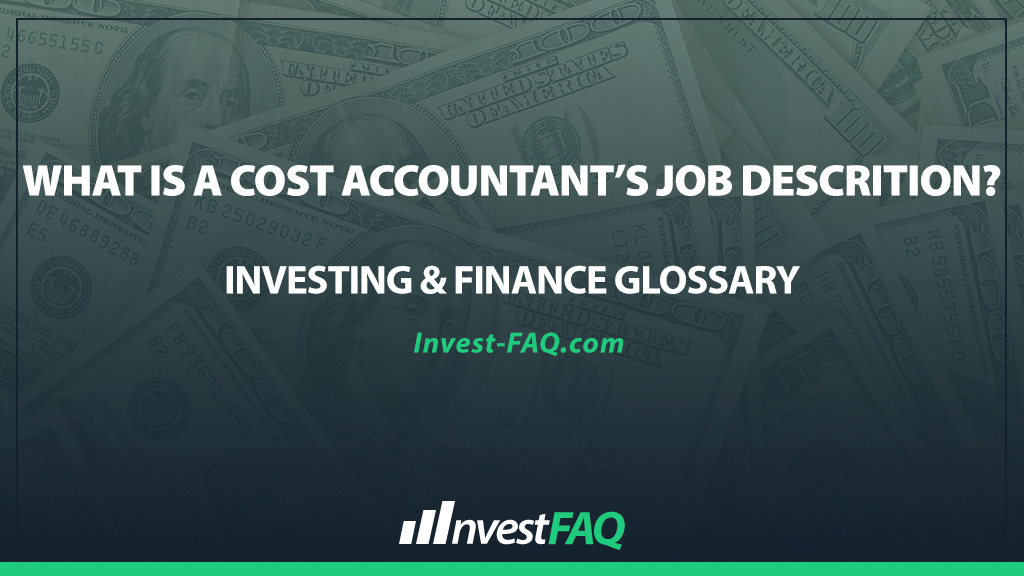
Cost Accountant’s Job Description
Contents
A cost accountant’s job involves the management and analysis of financial information related to a company’s costs of production or services, aimed at aiding in strategic planning, cost control, and financial decision-making. This role is crucial in ensuring that a company remains competitive and profitable by meticulously tracking and optimizing expenses.
In the business context, cost accountants are vital for companies looking to enhance operational efficiency and maximize profits.
They work across various departments, providing insights into cost-saving opportunities, budgeting, and pricing strategies. Their expertise supports key business decisions, from setting product prices to identifying investment opportunities and cost-cutting measures.
Example of a Cost Accountant’s Job Description
Imagine a manufacturing company, “Efficient Production Ltd.,” that specializes in consumer electronics. A cost accountant at Efficient Production Ltd. conducts a detailed analysis of the production costs associated with their flagship product.
This analysis includes direct materials ($40 per unit), direct labor ($20 per unit), and allocated manufacturing overhead ($15 per unit), totaling a cost of $75 per unit. Based on this information, and considering market competition, the cost accountant advises setting a retail price of $150 per unit to ensure a healthy profit margin while remaining competitive.
In this scenario, the cost accountant’s role was pivotal in determining the cost structure of the product, which directly influenced the pricing strategy. The accountant not only calculated the direct costs but also accurately allocated overheads to provide a comprehensive view of the total production cost per unit.
This process is essential in developing a pricing strategy that balances profitability with market competitiveness. The cost accountant’s analysis and recommendations are crucial for financial planning, setting strategic goals, and making informed decisions about production processes, cost efficiencies, and pricing.
Types and Uses in Business Scenarios
Cost accountants are instrumental in various business scenarios, including:
Budget Preparation and Analysis: Assisting in the creation of detailed budgets and comparing actual costs against budgeted forecasts to identify variances and their causes.
Cost Reduction Initiatives: Identifying inefficient areas in the production process or service delivery that can be optimized to reduce costs.
Inventory Management: Analyzing inventory levels to ensure they are in line with production needs and cost objectives, including the application of techniques like Just-In-Time (JIT).
Financial Reporting and Analysis: Preparing periodic cost reports for management, highlighting cost trends, and providing actionable insights for financial decision-making.
Significance for Investing & Finance
The role of a cost accountant is significant in accounting as it bridges the gap between financial accounting and management decision-making.
By providing a detailed analysis of costs, cost accountants enable companies to make informed strategic choices that affect the entire organization. Their work ensures that financial practices are closely aligned with operational activities, enhancing overall business efficiency and profitability.
In summary, a cost accountant’s job description encompasses a wide range of responsibilities, all centered around the analysis and management of costs.
Through their efforts, businesses are equipped with the necessary data to make strategic decisions, control expenses, and maintain competitive pricing, highlighting the indispensable role of cost accounting in achieving financial and operational excellence.
FAQ
What core skills are required for a cost accountant to be successful in their role?
A cost accountant must possess strong analytical skills, proficiency in accounting software and spreadsheets, and a thorough understanding of cost accounting standards and principles to analyze financial data and contribute to cost-effective business strategies effectively.
How does a cost accountant interact with other departments within a company?
A cost accountant frequently collaborates with various departments, including production, procurement, and sales, to gather necessary data for cost analysis and to provide insights that support cross-departmental budgeting and strategic planning efforts.
What kind of educational background is typically needed to pursue a career as a cost accountant?
Most cost accountant positions require a bachelor’s degree in accounting, finance, or a related field, with many employers also valuing professional certifications such as the Certified Management Accountant (CMA) designation.
Can a cost accountant’s recommendations influence a company’s strategic decisions?
Yes, the insights and recommendations provided by a cost accountant regarding cost control, pricing strategies, and budget allocations can significantly influence a company’s strategic decisions, impacting its profitability and competitive positioning in the market.
